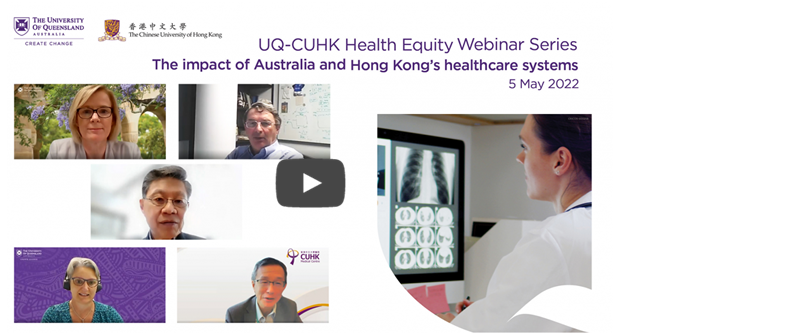
Galvanising global partnerships for sustainable development
As a socially responsible institution, CUHK is committed to working across borders and disciplines to generate innovative and impactful knowledge that supports the United Nations’ Sustainable Development Goals (SDGs). CUHK has topped Hong Kong’s universities in this year’s Times Higher Education Impact Rankings, which is a testament to our dedication in promoting sustainable development. We take pleasure to present some recent virtual programmes which leverage global partnerships for sustainable development.
Good health and well-being
Achieving universal health coverage, including financial risk protection and access to quality essential healthcare services and medicines, is one of the targets under SDG 3 Good Health and Well-being. At the last instalment of The University of Queensland (UQ)-CUHK Health Equity Webinar Series held on 5 May, four speakers from the two universities discussed their research on healthcare systems and made recommendations for improving their efficiency and impact across society. It attracted some 80 participants from around the world.
During the webinar, Prof. Stephen Birch, Taylor Chair and Director of the Centre for the Business and Economics of Health at UQ, presented his work on the economic evaluation of health services, and Prof. E.K. Yeoh, Director of the Centre for Health Systems and Policy Research at CUHK, spoke on the health financing strategies in Hong Kong and their implications for public hospitals and healthcare costs.
There was also discussion on the use of digital health to improve health system access, efficiency, and resilience. Prof. Fung Hong, Professor of Practice in Health Services Management in the Jockey Club School of Public Health and Primary Care at CUHK, remarked that telemedicine has made healthcare more accessible to people and the COVID-19 pandemic has served as a catalyst for boosting the usage. Prof. Tracy Comans, UQ Amplify Fellow in the Centre for Health Services Research at UQ, suggested that the implementation of digital hospitals would allow more and better virtual care, particularly to the rural and remote population in Australia, and hence reducing inequities.
Prof. Yeoh added, ‘In designing all these systems and technologies, equity must be a key principle. The governments need to consider and ensure more equitable access for vulnerable populations and older people.’
Watch the video to revisit the webinar:
Zero hunger and climate action
May also saw the launch of ‘The University of Sydney-CUHK SDGs Workshop: Partnership for Zero Hunger and Response to Climate Change’ hosted by Prof. Hon-ming Lam, Director of the State Key Laboratory of Agrobiotechnology (CUHK) and Prof. Brent Kaiser, Director of the Sydney Institute of Agriculture. The workshop drew some 70 participants from both universities and other partners and sparked new ideas and approaches to achieving food security and promoting sustainable agriculture in the face of climate change.
Twelve speakers, including Prof. Ting-fung Chan, Prof. Jerome Hui, and Prof. Jack Wong of the School of Life Sciences and Prof. Amos Tai of the Earth System Science Programme at CUHK, spoke on crop genomics, legume production and application, emerging technologies in agriculture and environmental research, and soil resilience.
Watch the video below to revisit the talks:
Reduced inequalities
According to the World Health Organization, COVID-19 and its containment measures have exacerbated existing inequities and created new vulnerabilities. With a view to stimulating dialogues on combating health inequity and building a more equitable and resilient future, the CUHK Centre for Bioethics, the CUHK Institute of Health Equity, and the Centre for Social Ethics and Policy at The University of Manchester hosted the ‘Webinar on International Perspectives on COVID-19: Ethics, Equity, and Public Health’ on 7 June where scholars of the two universities reflected on the public health responses to the pandemic and ethical considerations related to different approaches and policies.
Representing CUHK were Prof. Roger Chung and Prof. Hon-Lam Li of the CUHK Centre for Bioethics. The webinar attracted some 80 participants in 21 countries/regions.
Watch the video to revisit the webinar:
